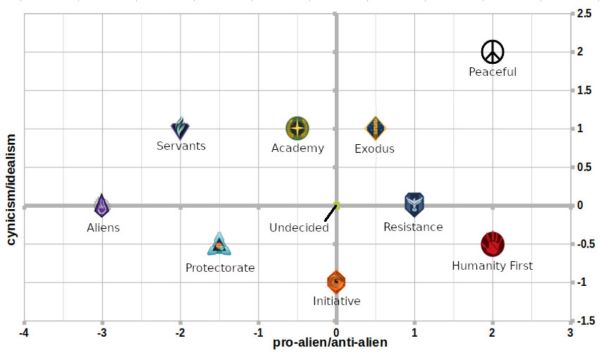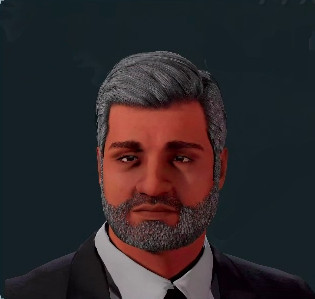The Protectorate: Difference between revisions
m (Refresh template) |
(Story) |
||
| Line 33: | Line 33: | ||
Field marshal of Protectorate, representing player's perspective. | Field marshal of Protectorate, representing player's perspective. | ||
== Story == | |||
{{SpoilerBox}} | |||
Kiran and his colleagues are the first to arrive to the UFO landing site, having an explicit goal to get an alien as a member of their organization. They get what they want, cover the traces of alien's escape and spend the next few months covering up abductions and other covert actions performed by aliens. | |||
When it becomes obvious that aliens aren't friendly, they decide to organize a public diplomatic meeting with aliens. Lavrentiy is allowed to organize it. The meeting goes not according to plan; Lavrentiy tries to enthrall diplomats, but some of them turn out to be resistant to pherocytes, which leads to a fight, some attendees getting killed and many escaping. Kiran mourns the loss of comrades, but refuses to assign responsibility to the Lavrentiy. | |||
Protectorate manages to catch everybody who was in the meeting, and prevent the public damage. The next diplomatic exchange happens remotely without any aliens in the room. The aliens declare their demands: to turn over all of the humanity's weapons of mass destruction, to build military platforms on Earth's orbit and to provide soldiers for Hydra's military operations on demand. Despite the loud protests of most of attendees, Kiran accepts all the demands on behalf of organization. | |||
The aliens start sending blueprints and materials for Sentinels, orbit-to-land weapons of mass destruction. Meanwhile, members of Protectorate start defecting, sabotaging the construction and leaking information to other factions. Kiran grows increasingly paranoid and starts concentrating executive powers in his hands. | |||
When construction of the Sentinels finishes, the Protectorate decided to do a demonstration of them to UN. It is agreed that Sentinels discharge into the middle of Atlantic Ocean; however, one of them fires at New York, where the remaining members of Protectorate's advisory board are meeting with UN delegation. During the ending cinematic Kiran talks about successfully ensuring humanity's survival and the importance of sacrifice to protect the things you value. After that, he breaks the fourth wall, thanks the player for saving humanity, claims that destruction of New York is malfunction but he already prepared a PR campaign with "aliens helping doctors healing children, that sort of stuff", says that tens of millions of soldiers leaving Earth will help solve overpopulation, and retires to India, leaving Lavrentiy and player in charge. | |||
{{SpoilerBoxEnd}} | |||
== Interaction with Other Factions == | == Interaction with Other Factions == | ||
Revision as of 17:42, 25 October 2022
Faction Ideology
The Protectorate starts optimistic and idealistic, viewing aliens as likely to be friendly and a way to help solve humanity's problems. Eventually Protectorate becomes more Machiavellian, turning into militaristic organisation collaborating with alien invasion and trying to follow their demands to the letter and even going beyond that at least once.
Faction Leadership
Protectorate is a group of government officials and various leaders united by their desire to start diplomatic exchange with the aliens and use their knowledge to help solve humanity's problems. As Protectorate's goals shift, many of its members become dissoluted and dessert, while all executive power gets concentrated in hands of three persons.
Comissioner Kiran Banerjee
Commissioner Kiran Banerjee is one of leaders of The Protectorate.
Appearance
Background
Born: Thiruvananthapuram (also known as Trivandrum), Kerala, India
- BA in Political Science, University of Chennai, 1975, where he was a member of the DMK Student Wing.
- Shot by police during anti-forced sterilization unrest in Muzaffanagar, Uttar Pradesh, in 1976.
- Resided in Vancouver, Canada, 1976-1980.
- Worked as civilian monitor and ombudsman for UN Peacekeeping operations in various locations, including Lebanon, Rwanda and Kosovo, 1980-2000.
- Master of Laws with a focus on international human rights law, Concordia University, 1984.
- Testified at war crimes tribunals as well as during prosecutions of peacekeepers who committed serious offenses during missions.
- Since 2000, he has served as an adviser to various human rights and peace organizations.
Quotes
We cannot fight a war that will result in our extinction. Our only hope is to understan what the aliens want us and determine how to satisfy them without losing our independence.
- faction blurb
Research
- "Just imagine, Ifechi, how this world would change if we could mass-manufacture building materials in an instant. Homes built for mere pennies! Irrigation for every village! A brighter, fairer future for all..." — Comissioner Kiran Banerjee, Excerpt from a letter to his partner while on assignment in Lagos
- "No matter what we do, no matter what we say, no matter how many appear to listen to us, mutual obliteration remains humanity's only end-game." — Comissioner Kiran Banerjee, In his letter resigning from the U.N. Department of Peace Operations
- "Choose a card. Now blow on it. Perfect! Then tap my hand three times. Wonderful!
And just like that… the card… floats away." — Comissioner Kiran Banerjee, Home video of his daughter's third birthday - "One dollar. That's what Paul Tibbets' mother paid for him to look inside an airplane at a local fair. Decades later, he flew the plane that killed 70,000 in Hiroshima. He named it Enola Gay, after his mother. All because of that one dollar." — Comissioner Kiran Banerjee, From his second book, "Blood Money."
- "All the old boundaries, the stratified lines of power, have been exposed as a fragile fiction by the aliens. Rights and authorities are awash. But we cannot forget that a person's daily struggles are only compounding; in this dangerous time, they still need food, medical care, and assurance that their labors will be meaningfully rewarded." — Comissioner Kiran Banerjee, Addressing the Association of Southeast Asian Nations
- "If some ancient race of brilliant, gentle snake-men suddenly crawled from the desert, they would have no rights, no protections! Any idiot with a rifle could turn a miracle into a pair of boots!" — Comissioner Kiran Banerjee, During a charged BBC Newsnight discussion about the refugee crisis
- "We destroy everything we touch, yet we cannot stop ourselves from touching more. We are so lost, Ifechi. So very lost." — Comissioner Kiran Banerjee, From an email to his partner, location unknown
- "Our technology could be used to end hunger, poverty, and disease. Yet, rather than raising up our entire species, it is widening the chasm between those with access and those without." — Comissioner Kiran Banerjee, Conclusion of his speech to the U.N. Global Summit on Responsible Technology Proliferation
- "Some say swords to plowshares is mere sentiment. But here we are, using our nuclear bombs to explore the far reaches of space, rather than doom our own home." — Comissioner Kiran Banerjee, Advocating for global nuclear disarmament on CNN
- "If we are to contemplate founding human society on another world, it is imperative that we learn from our past mistakes. It is a chance to start afresh, with fairness and equality the very bedrock of how we live." — Comissioner Kiran Banerjee, Speech at the International Peace Conference
- "Yes, it's true that this technology could be a godsend, but from Nobel to Oppenheimer, history teaches us that unchecked human instinct will cause even the most well-intended concept to go disastrously awry." — Comissioner Kiran Banerjee, Oral argument at the U.N. Ethical Proliferation of Technology summit
- "One would think that the master most despised is the one who stands over us, whip in hand. But no, it is the unseen and distant master, issuing his uncaring edicts from afar, whom we most yearn to overthrow." — Comissioner Kiran Banerjee, Arguing for the independence of Hong Kong on CNN
- "Empathy is not a muscle. You either possess it or you do not. It is those who do not who most limit human potential. If only there were some way to make them care, truly care, then everything would change in an instant." — Comissioner Kiran Banerjee, Keynote at sensitivity training seminar for undisclosed social media corporation
- "Only when we can look our enemy in the eye can we understand why he is not so different from ourselves. Then, only then, can we hope for peace, Ifechi." — Comissioner Kiran Banerjee, From a letter to his partner while stationed in Rwanda
- "Our advances in science and technology can be the key to the gates of heaven, but also to the gates of hell. We must choose wisely every time, or we may never choose again." — Comissioner Kiran Banerjee, Speech at the U.N. Science Summit
- "There is nothing, nothing we humans will not turn into a weapon if we can. Each fresh discovery we make only speeds us closer to destruction." — Comissioner Kiran Banerjee, "Blood Money."
- "Home is wherever you lay your head, it is said. If only this were true. Home, as far too many of us know, is only where no one is trying to destroy all that you hold dear." — Comissioner Kiran Banerjee, Comments made during a BBC World Service interview, during civil wars in the Balkans
- "I am impressed. That does not happen often. But tell me, what new weapons does this allow for, and when will they be ready? Anything else is of little consequence." — Comissioner Kiran Banerjee, Memo attached to blueprints for a proposed reactor design
- "Now as then, territorial disputes boil down to one group of people gazing upon a new land and calculating who would need to die so they could own it. Thousands of years of purported civilization have done so little to curtail our most basic reptilian impulses." — Comissioner Kiran Banerjee, During the U.N. Interstellar Resources Apportionment debate
- "Every time we build walls instead of bridges, we move further away from peaceful co-existence." — Comissioner Kiran Banerjee, Speech in front of the U.N. General Assembly
- "The less we burn, the longer we will survive. And the less we depend upon burning our natural resources, the fewer territorial conflicts we will suffer. It is forever bewildering to me how few of us can accept this simple concept." — Comissioner Kiran Banerjee, Guest lecture at the Beyond Fossil Fuels conference
- "Forgive me, Ifechi. I can happily talk to anyone for hours about how to improve society, yet sometimes replying to a simple email feels like the hardest thing in the world." — Comissioner Kiran Banerjee, Note attached to a flower delivery sent to his partner, 2008
Science
- "Have we lost all wonder when we gaze at the stars now? Have we already become so jaded at the prospect of peaceful coexistence? I sincerely hope not, because only our capability to see beauty will protect us from ourselves."
- "We look at nature, and we marvel at its diversity. We look at each other, and recoil at those different from ourselves. Why is it that humans seem to have more empathy for prey than peers?"
- "We have risen beyond our ancestors' wildest dreams. And yet, we still haven't learned how to share our wealth amongst us all."
- "In generating more than enough power for all mankind, we've only proven that there was never an energy crisis: only a crisis of greed."
- "Yes, knowledge is power, but power for what purpose, Ifechi? I want to believe that the more we learn, the more we grow. But the older I get, the more trouble I have shaking the feeling that we are dangerously close to the forbidden fruit of myth."
- "For all our advancement, we continue to devise increasingly efficient ways to kill each other. If this has taught me anything, it's that our sad purpose is the eternal refinement of the ultimate weapon: ourselves."
- "There is a theory that humans have a maximum quantity of others they can care about. Radiating in concentric circles, the further the circle, the less we care. We are a space-faring species, and our circle is now infinite. So, how do we start to care more?"
Trivia
Technology quotes imply that Kiran have been in relationship with someone named Ifechi for decades. Ifechi is a gender-neutral name of Nigerian/Igbo origin.
Chief Security Officer Lavrentiy
| SPOILERS INSIDE! |
|---|
| Advisory board member of extraterrestrial origin who joins the Protectorate sometime between landing of first UFO and first diplomatic exchange. Lacks cultural awareness. |
Unnamed commisioner
Field marshal of Protectorate, representing player's perspective.
Story
| SPOILERS INSIDE! |
|---|
|
Kiran and his colleagues are the first to arrive to the UFO landing site, having an explicit goal to get an alien as a member of their organization. They get what they want, cover the traces of alien's escape and spend the next few months covering up abductions and other covert actions performed by aliens. When it becomes obvious that aliens aren't friendly, they decide to organize a public diplomatic meeting with aliens. Lavrentiy is allowed to organize it. The meeting goes not according to plan; Lavrentiy tries to enthrall diplomats, but some of them turn out to be resistant to pherocytes, which leads to a fight, some attendees getting killed and many escaping. Kiran mourns the loss of comrades, but refuses to assign responsibility to the Lavrentiy. Protectorate manages to catch everybody who was in the meeting, and prevent the public damage. The next diplomatic exchange happens remotely without any aliens in the room. The aliens declare their demands: to turn over all of the humanity's weapons of mass destruction, to build military platforms on Earth's orbit and to provide soldiers for Hydra's military operations on demand. Despite the loud protests of most of attendees, Kiran accepts all the demands on behalf of organization. The aliens start sending blueprints and materials for Sentinels, orbit-to-land weapons of mass destruction. Meanwhile, members of Protectorate start defecting, sabotaging the construction and leaking information to other factions. Kiran grows increasingly paranoid and starts concentrating executive powers in his hands. When construction of the Sentinels finishes, the Protectorate decided to do a demonstration of them to UN. It is agreed that Sentinels discharge into the middle of Atlantic Ocean; however, one of them fires at New York, where the remaining members of Protectorate's advisory board are meeting with UN delegation. During the ending cinematic Kiran talks about successfully ensuring humanity's survival and the importance of sacrifice to protect the things you value. After that, he breaks the fourth wall, thanks the player for saving humanity, claims that destruction of New York is malfunction but he already prepared a PR campaign with "aliens helping doctors healing children, that sort of stuff", says that tens of millions of soldiers leaving Earth will help solve overpopulation, and retires to India, leaving Lavrentiy and player in charge. |
Interaction with Other Factions
Factions with Similar Ideology
The Servants see Protectorate as power-hungry opportunitsts, while Protectorate sees Servants as lunatics.
Aliens and Protectorate have the same goal. Despite this, as of 0.3.29, aliens may occasionally commit acts of aggression towards Protectorate, although it's unclear whether this is intentional or not. Alien administration always accepts alliance with Protectorate-led nations.
Factions with Conflicting Ideology
The Initiative calls Protectorate quitters, regardless of current diplomatic status.
Exodus sees Protectorate as irrelevant.
The Academy and Protectorate agree on their goals to protect humanity via diplomacy, but the Academy disagrees that the ends justify the means.
Anti-alien factions consider Protectorate to be collaborators, traitors and scum.
Faction features
If Protectorate isn't seen by aliens as threat, it may receive resources from them for free. This includes exotics.
Protectorate has access to ![]() Dominate Nation mission if it owns at least one Sentinel module. This mission allows them to take over one control point in any human nation, regardless of its size, protection, councilors protecting the region and orbital defenses. If this mission fails, CP ownership change happens anyway, but country loses some population and GDP. This mission has 30 noise, which means that councilors performing it are almost guaranteed to be revealed to other factions, making them vulnerable for assasinations.
Dominate Nation mission if it owns at least one Sentinel module. This mission allows them to take over one control point in any human nation, regardless of its size, protection, councilors protecting the region and orbital defenses. If this mission fails, CP ownership change happens anyway, but country loses some population and GDP. This mission has 30 noise, which means that councilors performing it are almost guaranteed to be revealed to other factions, making them vulnerable for assasinations.
 Hooded Horse Wikis
Hooded Horse Wikis



